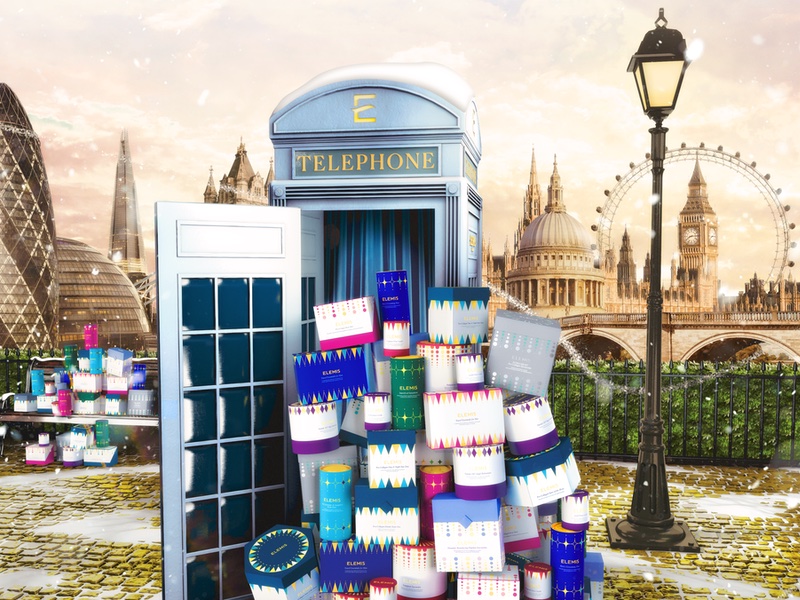Oriele Frank has hit the ground running since taking up her new role as Chief Product and Sustainability Officer of the brand she has helped steer for the last 30 years, Elemis.
Since taking up the position in October this year, the former MD of the brand’s home territory said she has become obsessed with looking for better ways to adopt a more sustainable business model.
“All I see is sustainability everywhere,” she told Cosmetics Business.
But, while Elemis might be one of the beauty brands late to establish its commitment to saving the planet, the brand wants to be a shepherd in the movement, showing the way for other beauty brands to tackle head-on issues of sustainability in the battle against climate change.

Oriele Frank
“I think the UK is going to start leading the change in attitudes towards the environment, and as a beauty brand in Britain we need to really be leaders in the fight against climate change.”
At the same time as her appointment, the British spa favourite made the monumental announcement that it would be refocusing its attention on reducing its environmental impact right across its supply chain, teaming up with the UN to develop a sustainability and CSR mandate.
Speaking to Cosmetics Business, Frank declared that no stone would go unturned in her new mission to reduce the brand’s footprint; all the way from product development to on-pack design, recyclability and social-economic initiatives.
“Every single part of the brand is being picked to pieces. Do we really need it? Can we remove it? What can we do better?”
And at the top of her to-do list is reducing Elemis’ carbon footprint.
“Climate change is the biggest threat we are facing on this planet, and the only way that’s going to slow down is if we reduce our carbon emissions, our waste and get people thinking in a different way.”
Keeping in line with Elemis’ beauty owner L'Occitane, Frank has committed to helping the group become completely carbon neutral by 2030. Eighteen months ago the brand also moved all of its gas and electricity at its distribution centre and head offices to green renewable energy.
However, the infancy of the plan means Elemis will release more details of its strategy in 2021.
Meanwhile, 2025 will mark another personal commitment that Frank wants to achieve and that’s to make all of Elemis’ packaging 100% recyclable.
“When we were working on Christmas, which is a huge part of our business, I asked what it would take to make it recyclable. A big part of the debate is using varnish, to keep it [outer packaging] from getting dirty; it loses recyclability, so we took that off.
“So we had to tone up the colours to make it brighter, we had to reduce down the amount of foil blocking on there, but we made all of Christmas’ outer packaging curbside recyclable.
“All it took was a discussion where we were all committed and we just had to communicate that.”
Attracting the eco-conscious Gen Z consumer
Early signs that change was afoot in the Elemis camp began in 2018 with its strategy to attract the growing eco-conscious Gen Z consumer.
The brand kicked off its beeline for the generation’s custom by introducing its Superfood skin care range. The collection was a fresh take on the traditional packaging used for its spa-focused products, using brighter and bolder colours and marketing materials that would speak to younger generations.
But not only were its campaigns and on-trend ingredients lists resonating with younger customers, Elemis took the decision to design on-pack labels that showed the packaging’s eco-credentials, how it could be recycled and that it was FSC-certified.
“This is the next generation, they’re very conscious about being sustainable. The paper was FSC, we put on the right symbols of how to recycle and what parts of the packaging can be recycled, and making it simple for the consumer.”
And this initiative is something Frank wants to adopt for all of the brand’s packaging.

Elemis' 2020 Christmas outer packaging is all curbside recyclable
“We’ve decided to do that on all of our packaging and be very transparent.
“There’s going to be a circle on there that tells you exactly what pack is PP and recycled, and if the tube is a mono-layer – and if it’s not then it won’t be featured on there, so the consumer immediately knows exactly what they can and can’t do.
This attitude will also extend to sourcing ingredients for Elemis’ ingredients. The brand has a host of seaweeds and marine components to thank for its formulas, making Frank feel responsible for the future of maritime biodiversity.
“Marine conservation has come up quite strongly because we use a lot of seaweeds and we want to know how we can influence that,” she added.
“Our overall aim is to be a responsible brand. We want to contribute positively to address everything from global society and environmental challenges, that means the climate change that we’re all very aware of, to biodiversity and ensuring we’re not taking everything out of the earth without putting something back in.”
Uniformity in beauty
But despite Frank’s enthusiasm for her brand’s challenge she is under no illusion the task will be a straightforward one.
“This for me has presented a whole new challenge to change the whole business at such an important time and I’m so excited by it.
“It’s going to take time, not everything will be done overnight and we are really trying to change up. The industry really feels like it’s completely behind this.
But with backing from her fellow board members, Frank is confident that the brand’s internal commitment to sustainability will be the driving force behind the change.
“It’ll be the first time we really put sustainability at board level alongside profit and I think that’s a real change of mindset and that’s very much part of the founding team, our CEO [Sean Harrington] is the one championing this. Coming from the top it makes it a much better message.
“It will be the icing on the cake for Elemis if we can deliver everything that we want to.
“We know we’ve got amazing formulas, we know we’ve got a great story, we know we’ve got the passion, but we have to be better in the areas of sustainability and we have to think more broadly about the planet.”
